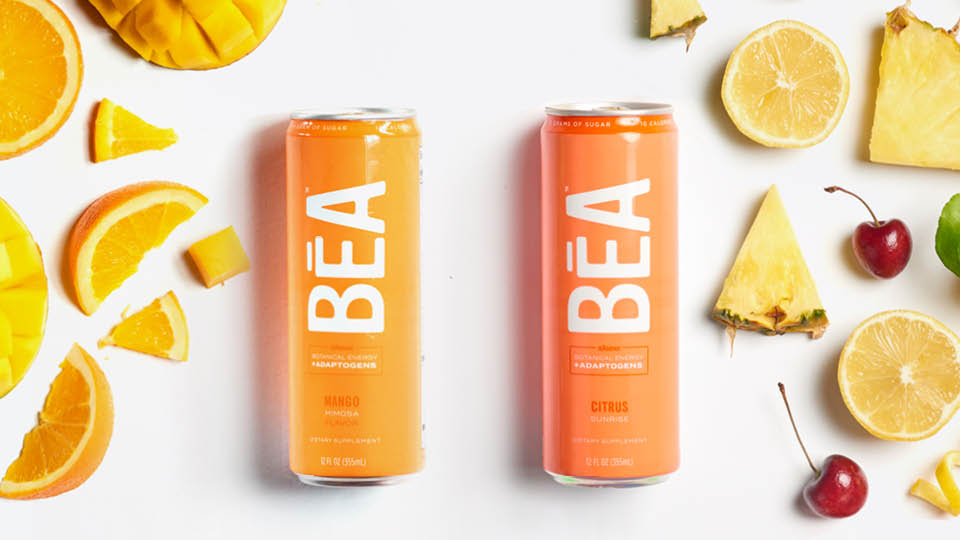What is BĒA?
BĒA™ stands for botanical energy + adaptogens. BĒA is a carbonated energy drink providing 12 essential vitamins from fruit and vegetable ingredients, naturally sourced caffeine from green tea, and adaptogens including ashwagandha and shiitake and maitake mushrooms. BĒA comes in sparkling, fruity flavors that provide a refreshing boost of energy.
How much caffeine is in a serving of BĒA?
BĒA contains 125 milligrams of caffeine per 12-ounce can. For comparison, a typical 12-ounce “tall” coffee contains about 150 milligrams of caffeine.
What makes BĒA different from other energy drinks?
BĒA is a sparkling, clean energy drink with naturally sourced caffeine from green tea plus botanical ingredients like adaptogens. It has a unique blend of 12 vitamins sourced from whole-food fruit and vegetable ingredients and is packed with antioxidant vitamins A and C. BĒA contains potent green tea polyphenols and caffeine to help boost metabolism, and is gluten-, soy-, and, dairy-free. BĒA is also suitable for vegans. Naturally flavored without sugary juices, BĒA is crafted with stevia, monk fruit, and other naturally sweet ingredients giving it less than one gram of sugar and 10 calories per 12-ounce can.
What are sugar alcohols and what is their purpose in BĒA?
Sugar alcohols, or polyols, are found in fruits like apples, plums, and cherries and offer a naturally sweet taste. Although they’re included as part of total carbohydrates on nutrition labels, sugar alcohols provide fewer calories than sugar or other carbohydrates and won’t cause a rise in blood glucose levels. They don’t contain the type of alcohol that you would find in an alcoholic beverage. Their name only refers to aspects of their chemical structure. Erythritol is the sugar alcohol that provides a natural source of sweetness in BĒA . It’s almost as sweet as ordinary cane sugar, yet it contributes practically no calories.
Who is BĒA recommended for?
BĒA is recommended for individuals over the age of 16. Children under the age of 16, women who are pregnant or breastfeeding, and individuals with a medical condition affected by caffeine should check with a healthcare professional before consuming.
Can I drink BĒA on a Cleanse Day?
BĒA contains 10 calories per serving and can be incorporated into your Cleanse Day schedule.
How is BĒA different from e+?
While BĒA and e+™ both offer long lasting energy from naturally sourced ingredients, BĒA is a carbonated energy drink with raw nutrients and vitamins sourced from fruits and vegetables, 125 milligrams of caffeine, and select adaptogens. e+, on the other hand, is an energy shot with 85 milligrams of caffeine and a blend of 10 adaptogen ingredients. BĒA has about as much caffeine as 1 ½ servings of e+.
e+ is the ideal companion for natural energy on the go or during activity as a quick energy shot. BĒA is a refreshing opportunity to help you start your day, work or study, or get an afternoon spark. Enjoy it one sip at a time throughout your day.
What’s the difference between the adaptogens in Ionix, e+ and BEA? Should I take all three?
Adaptogens are found in many Isagenix products including Ionix Supreme®, e+, and BĒA. While some ingredients like ashwagandha are shared by all three formulas, each product has its own unique blend to provide your body with the balance and support it needs.
Ionix Supreme is an adaptogen-rich tonic with 13 adaptogens to help protect against the negative effects of stress without any added caffeine. e+ combines a blend of 10 adaptogens and 85 milligrams of naturally-sourced caffeine from green tea and yerba mate for a quick boost of energy. BĒA contains adaptogens including ashwagandha, and shiitake and maitake mushrooms along with 125 milligrams of caffeine from green tea and raw-sourced vitamins to help boost metabolism and give your body nutrition-fueled energy.
If you chose to combine BĒA and e+, be mindful that both of these products contain caffeine.
How many servings are recommended per day?
We suggest consuming up to two servings of BĒA per day.
Is the BĒA can BPA-free?
BĒA cans do not contain bisphenol A (BPA), an environmental toxin used in epoxy resins to coat the inside of some metal food and beverage cans.
Is the BĒA packaging recyclable?
Yes, BĒA is packaged in recyclable aluminum cans and plastic film that is accepted at many recycling drop-offs.
Should I be concerned about the carbonation in BĒA?
Carbonated water is simply water that has been infused with carbon dioxide, a naturally occurring gas in Earth’s atmosphere. Nevertheless, some concerns have been raised in relation to the health effects of carbonated water including:
- Acidity – Carbon dioxide and water can react to form carbonic acid, a weak acid. However, consuming carbonated beverages will not make your body more acidic as your kidneys and lungs remove any excess carbon dioxide.
- Digestion – Carbonated water may benefit digestion by positively affecting gastrointestinal health and feelings of fullness (1-3).
- Bone – In a large observational study including over 2,500 people, carbonation had no significant measurable effect on bone health (4).
- Dental health – Carbonated water appears to pose little risk to dental health and is approximately on par with water in relation to risk for enamel erosion (5). It is only when paired with high levels of sugar that harmful effects have been reported (6). BĒA contains less than one gram of sugar per can.
- Heart – While limited, some research with carbonated water suggests a potential benefit on heart health (7).
In summary, there is no evidence that the carbonation in BĒA is of any health concern.
What is the price of BĒA Sparkling Energy Drink?
BĒA comes in a case of twelve 12-ounce cans. Each pack costs US$39.99.
References
- Cuomo R, Grasso R, Sarnelli G, Capuano G et al. Effects of carbonated water on functional dyspepsia and constipation. Eur J Gastroenterol Hepatol. 2002 Sep;14(9):991-9.
- Pouderoux P, Friedman N, Shirazi P et al. Effect of carbonated water on gastric emptying and intragastric meal distribution. Dig Dis Sci. 1997 Jan;42(1):34-9.
- Wakisaka S, Nagai H, Mura E et al. The effects of carbonated water upon gastric and cardiac activities and fullness in healthy young women. J Nutr Sci Vitaminol. 2012;58(5):333-8.
- Tucker KL, Morita K, Qiao N et al. Colas, but not other carbonated beverages, are associated with low bone mineral density in older women: The Framingham Osteoporosis Study. Am J Clin Nutr. 2006 Oct;84(4):936-42.
- Parry J, Shaw L, Arnaud MJ et al. Investigation of mineral waters and soft drinks in relation to dental erosion. J Oral Rehabil. 2001 Aug;28(8):766-72.
- Jain P, Nihill P, Sobkowski J et al. Commercial soft drinks: pH and in vitro dissolution of enamel. Gen Dent. 2007 Mar-Apr;55(2):150-4; quiz 155, 167-8.
- Schoppen S, Pérez-Granados AM, Carbajal A et al. A sodium-rich carbonated mineral water reduces cardiovascular risk in postmenopausal women. J Nutr. 2004 May;134(5):1058-63.





